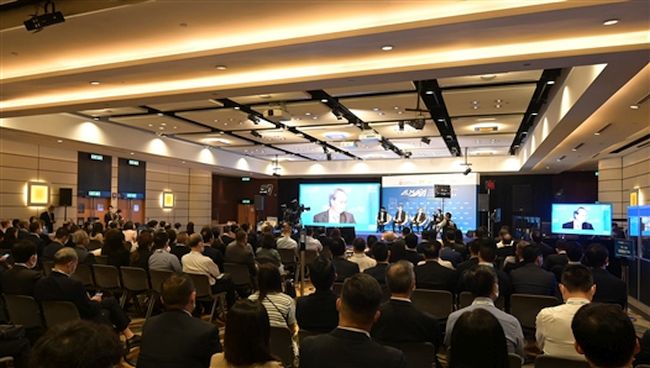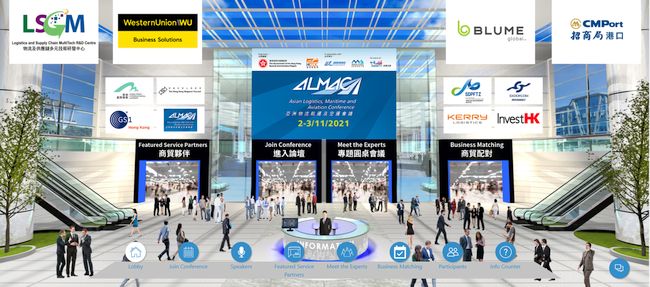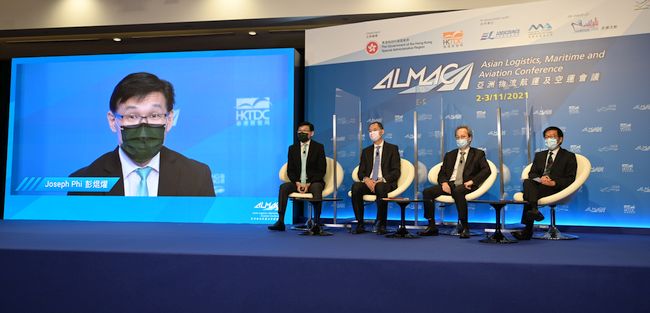- Industry elites examine key issues as global supply chain reshapes
Jointly organised by the Government of the Hong Kong Special Administrative Region (HKSAR) and the Hong Kong Trade Development Council (HKTDC), the 11th Asian Logistics, Maritime and Aviation Conference (ALMAC) opened today at the Hong Kong Convention and Exhibition Centre (HKCEC), running in a hybrid format, with both physical and online elements, for the first time. At this annual signature event for the maritime, air freight, logistics and supply chain management sectors, 60-plus industry experts and leaders will share their insights at close to 30 sessions. The two-day conference expects to attract more than 10,000 viewers from some 60 countries and regions.



Carrie Lam, Chief Executive of the HKSAR, officiated at the online opening. Margaret Fong, Executive Director of the HKTDC, welcomed international delegates to the conference, saying: “Central to this year’s conference theme – ‘RESILIENCE. AGILITY. SUSTAINABILITY Reshaping the Global Supply Chain’ – we will discuss the evolving intermodal networks in the Asia-Pacific region, e-commerce fulfilment and the post pandemic retail evolution. More important, we are also looking at the trend for sustainable supply chains, the opportunities and risks this global reshaping presents for industry players, as well as the way forward for sustainable development. New opportunities under China’s 14th Five-Year Plan will also be explored.”
Catching market trends from online to offline
Running in a hybrid format, the conference enables participants from around the world to expand business connections and explore partnership opportunities both virtually and face-to-face. Six satellite venues have been set up through different regional oraganisations and institutions to enhance the experience. Industry representatives can join the event at the main venue in Hong Kong or satellite venues in Chengdu, Chongqing, Guangzhou, Wuhan, Hamburg and more. In addition to running a live broadcast of the conference, some of the satellite venues have invited experts to address logistics issues and experiences from a more local perspective and enable participants to enjoy face-to-face exchanges and business matching activities at the same time. Virtual roundtable meetings have also been organised to connect international participants from Belgium, France, Germany, Italy and Luxembourg with industry players and associations from Hong Kong and Mainland China, helping to create new business opportunities.
In addition, a newly added physical and virtual exhibition showcases different logistics technologies, including 5G technology for warehouse management, smart logistics solutions, international payment solutions and the latest smart port developments, connecting participants with the best business solutions. The ALMAC virtual platform also provides several interactive functions including artificial intelligence (AI)-driven business-matching services.
Exploring the current business landscape
The three Power Dialogue sessions are the highlight of this year’s conference, with heavyweight speakers examining the industry outlook and sharing valuable insights. As supply chains become more regional than global, leading to changing trade patterns and evolving supply chain networks in the Asia-Pacific region, ALMAC kicked off this morning with a Power Dialogue discussion on the theme “New trade order and evolving intermodal networks in the Asia-Pacific”. Several salient topics were explored, including how shippers and big industry players can address the challenge of a changing supply chain network in the post-pandemic era. Moderated by Billy Wong, Deputy Director of Research, Hong Kong Trade Development Council, the speakers at the session included Raymond Fung, Director of Trades, Orient Overseas Container Line; Kelvin Leung, CEO, DHL Global Forwarding Asia Pacific; and Joseph Phi, Group CEO, Li & Fung.
In the Power Dialogue session on day two of the conference (3 November), themed “Post-pandemic megatrends in e-commerce”, Kenny Ng, Logistics Director of Global Supply Chain, Cainiao Network, and Hita Supranjaya, Director, Buka Pengadaan Indonesia, Bukalapak, will examine the new logistical challenges merchants are facing and explore how they can develop fulfilment strategies that adequately address supply chain, inventory management and delivery issues.
Numerous governments around the world have committed to achieving net-zero carbon dioxide emissions by 2050 and the global supply chain will definitely play a role in achieving this goal. Under the theme “Beyond 2050: A quest for zero-carbon and sustainable supply chain”, the final Power Dialogue session will have Tony Domingo, Senior Vice President, Group Supply Chain and Procurement, Nestle China, and Ed Lam, CEO, LFX, sharing their thoughts.
Capturing GBA opportunities and the future for smart air cargo
With its modern and sophisticated aviation hub and factors such as its simple and fast customs clearance procedures, Hong Kong’s air cargo transport sector has developed as one of the world’s major players. Despite the severe impact of the pandemic on global air freight activities over the past year, international cargo traffic through the Hong Kong hub has remained resilient. Through the development of the Guangdong-Hong Kong-Macao Greater Bay Area (GBA), the city looks set to play an important role in the future development of aviation and logistics in the region. On the first day of the conference, the Air Freight Forum (Part I) featured Kaiser Lam, Regional Vice President Hong Kong & South China, Expeditors International of Washington, Inc, and Frosti Lau, Chairman, HKIA Air Cargo Carrier Liaison Group, exploring ways for companies to capitalise on GBA-focused opportunities.
The demand for air cargo remains buoyant as world trade continues to gain momentum, particularly in the e-commerce sector. However, the air freight industry has lagged behind in digitalisation and its efficiency not only needs to evolve to meet booming demand for e-commerce, perishables and specialty cargo shipments, but must also adapt to accommodate shifting supply lanes amid changing trade environments and evolving consumer expectations. This is creating significant logistics challenges and the digitalisation of air cargo management has become key to the industry’s progress. In the Air Freight Forum (Part II), Victor Mok, Chairman and CEO, Asset Service Platform, GLP China; Mark Slade, Managing Director, DHL Global Forwarding Hong Kong & Macau; Brendan Sullivan, Global Head of Cargo, International Air Transport Association; and Yvonne Ho, General Manager, Hong Kong & Macau, International Air Transport Association, examined the future for smart air cargo.
Hong Kong’s changing role as international maritime centre
In a world of increasing global competition, a market imbalance in supply and demand for goods, empty containers, and a shrinking tanker and bulker market have created challenges for the global supply chain. In Maritime Forum 1 on the first day of the conference, Jeremy Nixon, CEO, Ocean Network Express Pte, and Tim Power, Managing Director, Drewry Shipping Consultants, examined the major transformations taking place in the industry. Maritime Forum 2 featured Kenta Matsuzaka, Director, Senior Managing Executive Officer, Mitsui O.S.K. Lines; Martin Stopford, Director, Marecon; and James Tong, Managing Director, Head of Global Shipping & Logistics, Asia Pacific and Japan, Citi, discussing how green ship financing and carbon-zero trading has become a roadmap to a carbon-neutral 2050.
Hong Kong has long been a provider of high-value-added maritime services. Various measures have been introduced, including tax concessions for ship leasing and maritime insurance, as well as support measures for the maritime arbitration and training sectors. Moreover, the Belt and Road Initiative and the development of the Greater Bay Area are expected to bring enormous opportunities for all commercial sectors, including shipping. The Insight Exchange session has invited Sabrina Chao, President, BIMCO; Bjorn Hojgaard, CEO, Anglo-Eastern Univan Group; Rosita Lau, Partner, Ince & Co and Jonathan Jones, Director and Project Coordinator, Crew Assist, to discuss Hong Kong’s role as an international premier maritime centre and the way forward.
SCM & Logistics Forums cover digitalisation in logistics and social commerce
As the development of logistics and the supply chain is gradually driven by digitalisation, two SCM & Logistics Forums will be held tomorrow (3 November) to discuss digitalisation in logistics and supply chain agility. Co-organised with the Hong Kong Shippers’ Council, the first forum will include speakers from different organisations to examine the development of digitalisation in the logistics industry. Co-organised with GS1 Hong Kong, the second forum will discuss how firms achieve supply chain agility, building a competitive advantage in fast-changing markets and so enhancing business continuity.
Brand-new session allows real-time interaction
The Exclusive Dialogue sessions will look into the challenges faced by shippers and share how corporations can develop new business models, operations and measures to minimise disruptions and risks. These new sessions will allow local participants to interact with conference speakers face-to-face.
InnoTalks and MarketTalks return to examine industry issues
The InnoTalks and MarketTalks sessions both return in 2021, with the former featuring smart port development in the Asia-Pacific region, latest developed heavy-lift cargo drones and digital solutions for ESG compliance reporting, helping conference participants keep abreast of technological developments in the industry. With logistics service users encountering various kinds of hindrances while conducting foreign trade, the MarketTalks sessions will feature key industry players from Chongqing, Guangzhou, Nansha, Neijiang, Qingdao, Shaanxi, Malaysia and Vietnam to provide the latest market insights and opportunity analysis, guiding attendees to explore business opportunities in the logistics ecosystem.
The ALMAC virtual platform provides several interactive opportunities to connect industry players. Among them, the Meet the Experts roundtable will be conducted in both online and physical formats, inviting shippers and logistics service providers to create more cross-industry interaction and discussion and provide participants with feasible insights and practical suggestions, helping to address some of the current supply chain challenges.
Flagship event of Hong Kong Maritime Week
ALMAC is a flagship event of Hong Kong Maritime Week, organised by the Hong Kong Maritime and Port Board. The conference is supported by the Hong Kong Logistics Development Council and Hong Kong Maritime and Port Board. The HKTDC invited 20 global leaders from the logistics and shipping industries, along with representatives from internationally renowned companies, to serve as honorary advisors on setting the agenda and content of ALMAC.
ALMAC: https://www.almac.hk/main/en/
ALMAC programme: https://www.almac.hk/main/en/s/info-programme2021
ALMAC speaker list: https://www.almac.hk/main/en/speaker/2021Speakers
Photo download: https://bit.ly/2ZFceXo
About HKTDC
The Hong Kong Trade Development Council (HKTDC) is a statutory body established in 1966 to promote, assist and develop Hong Kong’s trade. With 50 offices globally, including 13 in Mainland China, the HKTDC promotes Hong Kong as a two-way global investment and business hub. The HKTDC organises international exhibitions, conferences and business missions to create business opportunities for companies, particularly small and medium-sized enterprises (SMEs), in the mainland and international markets. The HKTDC also provides up-to-date market insights and product information via research reports and digital news channels. For more information, please visit: www.hktdc.com/aboutus. Follow us on Twitter @hktdc and LinkedIn
Media enquiries:
HKTDC’s Communications & Public Affairs Department
Christine Kam, Tel: +852 2584 4514, Email: christine.kam@hktdc.org
Clayton Lauw, Tel: +852 2584 4472, Email: clayton.y.lauw@hktdc.org














